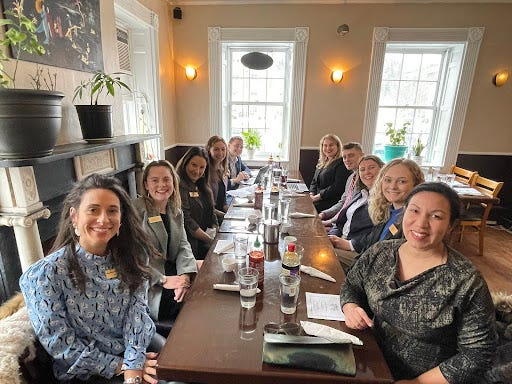ON THE RISE TOUR — VERMONT FUTURE CAUCUS
January 27, 2023

We need less heat and more productivity in politics. Young leaders are frustrated with the political gridlock of previous generations, and they are resolved to govern differently.
A breath of fresh air swept Montpelier this week as young state lawmakers put aside their partisan labels. Through a series of policy discussions, a tripartisan group of legislators created plans to address housing affordability, talent retention, legislature modernization, and mental health access, among other issues.
These conversations were convened by the Vermont Future Caucus, a legislative caucus for Gen Z and Millennial representatives and senators. Re-launched this June, the group includes Progressive, Republican, and Democratic members and is led by co-chairs Representative Casey Toof (R) and Senator Becca White (D). The legislators share a common goal: tackle political polarization in order to create results for the youngest Vermonters across the state.
The policy discussions in Vermont coincide with a larger mobilization of young lawmakers across the country who are committed to transcending political polarization. As part of its nationwide On the Rise Tour, the Millennial Action Project hosted an event this week for the Vermont Future Caucus to connect community members, young activists, and legislators of all ages.

Rep. Toof and Senator White had an opportunity to share their goals for the caucus on a panel discussion titled “A New Generation of Leadership in Vermont: The Future of Collaboration at the Capital.”
The legislators made it clear you don’t have to leave your party’s perspective or principles at the door in order to find common ground. “It’s interesting to me because even though I consider myself to be very liberal… I have found that there are a lot of bread and butter Vermont issues that people across the state support and want to work on together,” said Senator White.
Rep. Casey Toof chimed in, “When I was first elected, I thought I’m going to go down to the capital and fight, and that’s how I would get everything done. Then you come down here and realize that everyone serving are actual people… They want to know how your kids are, what you did this week — they are nice people. You think to yourself, ‘oh… so I can’t hate them right now…’ and you end up working with them.”
Event participants included over a dozen young lawmakers and several prominent leaders in the statehouses, which Rep. Toof pointed out. “I know we have the House Minority Leader, the Senate Majority Leader, and the Lieutenant Governor here, so if you want to talk about a spectrum of political opinions and the ability to work across the aisle, we have some people here that can make it happen,” said the legislator.

The Vermont Future Caucus re-launched just last June with the idea that Vermont had a “young people problem.” It was in part a response to a report that identified Vermont as one of the fastest aging states. Millennials, ages 26–45, make up less than 12% of the population. What the state lacks in young people, they make up for in young people’s problems. Vermont is ranked #13 in the nation for the highest student loan debt, #16 for the highest childcare costs, and only #39 for housing affordability. The Vermont Future Caucus has been hard at work to present solutions with widespread support.
“I ran [for office] because I have two young kids at home. I want to make sure they have a Vermont that has the same opportunities I had growing up, maybe even better. I want to build a Vermont that is good for them to live, work, and build a family eventually,” said Rep. Casey Toof.
Another goal of the Vermont Future Caucus is to support young people once they win office and are serving in the legislature. The co-chairs offered wisdom to the newly elected young lawmakers in the room.
“The biggest advice I would give is to network with as many people as you can. You are not always going to get what you want… and you can find information from anyone…Talk to people, talk to as many as you can,” suggested Rep. Casey Toof.
He continued, “Being in the minority party, my entire job is working across the aisle to get what I want. To me, we usually have the same goal in mind, it’s just how we get there… 90% of issues we agree on, but it’s the part where we don’t disagree that really gets highlighted.”
Senator White echoed his advice. “Find your people. There are people in the statehouse that are just hidden gems. There are people who you will see… and if you have a moment to sit down and get to know someone — even someone who you would have never talked to in any other scenario — you are going to find the most beautiful human being. Once you make a connection with them, it’s so much easier to bridge the gap and make good policy.”
This empathetic approach to leadership and policymaking is a hallmark of Millennial Action Project’s ethos. It is key to building a healthier governing culture that prioritizes future-oriented solutions.
Vermont is just one of MAP’s many points of proof that the Future Caucus model works. It creates a permission structure that unites legislators along their shared generational identity so they might transcend their partisan differences. As we look to a new season of Millennial and Gen Z governing, MAP is excited to continue to empower and convene these young leaders. Watch out for more future-focused policy coming from state legislatures with the continuation of the On the Rise tour throughout 2023!







Join 1,900+ BIPARTISAN LEADERS NATIONWIDE
Be a part of a network of lawmakers committed to governing effectively, passing more representative public policy, and increasing public trust in democracy.